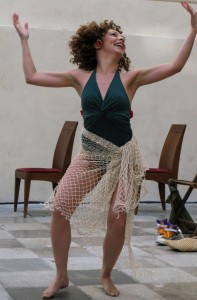
Article courtesy of Art Attack Philly, in association with Drexel University and the Knight Foundation. See the original article here.
What better way to welcome the coming spring than with flamenco? Flamenco, which means “flame-colored,” is a genre of Spanish folk dance and music traditionally characterized by sensual choreography and bold, complex guitar rhythms. In Philadelphia, dance company Pasión y Arte is bringing the spirit of modern flamenco to the Philadelphia Flamenco Festival, which runs from March 1st through March 16th.
The festival showcases a wide variety of performances featuring an all-female cast, many of which are hosted at Drexel University. For the budding flamenco dancer or inquisitive audience member, there are interactive classes and educational lectures. Company director, Elba Hevia y Vaca, was inspired to organize the festival after traveling to Spain and attending the “Festival de Jerez,” a two week-long flamenco festival which occurs each spring in Jerez, Spain.
As Hevia y Vaca notes, a vibrant flamenco community exists in the city, but a festival had never taken place here until 2012 when she first founded the Philadelphia Flamenco Festival. One of her goals through implementing the festival was to share modern forms of flamenco, which strive to bring modern relevance to a historical genre of dance and music.
“It has been my dream to bring 21st century flamenco artists to Philadelphia. My interest is in that particular type of flamenco, which is innovative and relevant,” says Hevia y Vaca. “You’re going to see the kind of flamenco that is happening in Spain, and I think Philadelphia is ready for that.”
Hevia y Vaca also believes that Philadelphia is ready for feminist flamenco, as she strives to transform this traditionally male-dominant art form into a vessel for female expression. Pasión y Arte is an all-female dance company, and the works of the festival strive to showcase the perspectives and experiences of women in flamenco. “Flamenco used to be very much about, as a woman, being desired as a sexual object,” Hevia y Vaca says. “I’m interested in women being protagonists of their own stories.” She instead focuses on the narrative of flamenco, while maintaining the strength and boldness conveyed by traditional postures and movements.
The timing of the Philadelphia Flamenco Festival is perhaps unfortunate this year. On February 26th, Spanish flamenco guitarist and musical legend Paco de Lucía died at the age of 66, just before the start of the festival. Of his death, Hevia y Vaca says, “I can’t imagine not dedicating the festival to him. We will have to take a moment to say thanks for his incredible leadership and guidance. For us, he was a visionary.”
One of the Pasión y Arte guitarists, Dani de Morón, had worked with de Lucía in the past. The Pasion y Arte dance company and the flamenco community as a whole are currently struggling to process the loss of the iconic de Lucía. He forever changed flamenco guitar playing and was one of the pioneers of contemporary flamenco. Without the works of de Lucía, flamenco may have fallen into obscurity, as he helped this historical genre of music and dance transition seamlessly into the modern age.
There’s something for arts lovers of all kinds at the flamenco festival. If you’re interested in attending any of the festival events, it would be wise to purchase tickets as soon as possible. At the last Flamenco Festival, in 2012, Hevia y Vaca says, “Eight performances sold out, so that shows you exactly the amount of interest. [The audience] is not just of people who love flamenco, its people who love dance, who love culture, who love music.”
Images courtesy of the Philadelphia Flamenco Festival.
